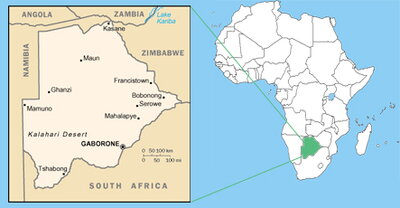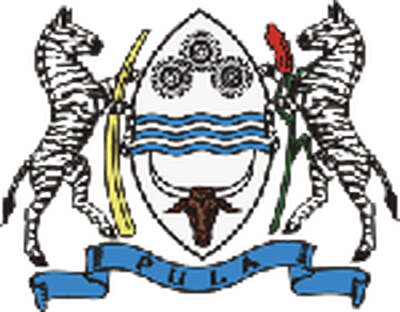

Region: Southern Africa
Quick Facts:
- Population: 1.7 million
- Capital: Gaborone
- Area: 224,607 sq miles (Slightly smaller than Texas)
- Major Languages: English, Setswana
- Life Expectancy: 36 years(men), 37 years (women)
- Literacy: 81.2%
- Monetary unit: 1 Pula (BWP)=100 thebes
- Exchange Rate: US $1=7.704 BWP (Jan 10, 2009)
- Income (GDP) per capita:$10790 (constant 2000 international $, WDI 2005)
- Urban population: 57% of total population
- Paved roads: 35% of total road surface
- Electric Power Consumption (per capita): 1553 kWH
- Fixed line and mobile phone subscribers: 395 (per 1,000 people)
- Internet Users: 34 (per 1,000 people)
- Internet Domain: .bw
- Country Code: +267
- Time Difference: UTC+2 (8 hours ahead of Illinois during Standard Time)
- Climate: Semi-arid and ubtropical. Hottest months are January and February (63-102F), coldest months are June and July (43-68F)
- Type of Government: Republic
- President: Festus Mogae
Historical Background:
In the late nineteenth century, hostilities broke out between the Tswana inhabitants of Botswana and Ndebele peoples who were migrating into the territory from the Kalahari Desert. Tensions also escalated with the white Boer settlers from the Transvaal in present-day South Africa. In a bid to preserve their territory, Batswana leaders Khama III, Bathoen and Sebele took assistance from the British Government. In 1885 Britain put "Bechuanaland" under its protection. The northern territory remained under direct administration as the Bechuanaland Protectorate and is today's Botswana. The southern territory became part of the Cape Colony and is now part of the northwest province of South Africa.
In June 1964, Britain accepted proposals for democratic self-government in Botswana. The seat of government was moved from Mafikeng in South Africa, to newly established Gaborone in 1965. The 1965 constitution led to the first general elections and to independence on September 30, 1966.
Socio-political Background:
The politics of Botswana takes place in a framework of a presidential representative democratic republic, whereby the President of Botswana is both head of state and head of government, and of a pluriform multi-party system. Executive power is exercised by the government. Legislative power is vested in both the government and the Parliament of Botswana.
Seretse Khama, a leader in the independence movement and the legitimate claimant to the Ngwato chiefship, was elected as the first president, re-elected twice, and died in office in 1980. The presidency passed to the sitting vice president, Ketumile Masire, who was elected in his own right in 1984 and re-elected in 1989 and 1994. Masire retired from office in 1998. The presidency passed to the sitting vice president, Festus Mogae, who was elected in his own right in 1999 and re-elected in 2004.
Botswana has been hit very hard by the AIDS epidemic; the average life expectancy in Botswana at birth, 1990: 64 years, 2005: 34 years. This is barely half the 59-year average for low-income countries, and Botswana residents, along with those of Swaziland, have the shortest average lifespan in the world. The adult prevalence rate of HIV/AIDS in Botswana is 23.9 percent of the population, and 11,000 HIV/AIDS deaths were estimated in 2007. The government recognizes that HIV/AIDS will affect the economy and is trying to combat the epidemic, including free antiretroviral drug treatment and a nation-wide Prevention of Mother-to-Child Transmission program.
Economy:
Since independence, Botswana has had the highest average economic growth rate in the world, averaging about 9% per year from 1966 to 1999. The relatively high quality of Botswana's statistics means that this figure is likely to be quite accurate. Growth in private sector employment has averaged about 10% per annum over Botswana's first 30 years of independence. The government has consistently maintained budget surpluses and has substantial foreign exchange reserves totaling about $6.2 billion (6.2 G$) in 1999.
Botswana's impressive economic record has been built on a foundation of diamond mining, prudent fiscal policies, international financial and technical assistance, and a cautious foreign policy. It is rated the least corrupt country in Africa, according to international corruption watchdog, Transparency International.
Agriculture still provides a livelihood for more than 80% of the population but supplies only about 50% of food needs and accounts for only 3% of GDP. Subsistence farming and cattle-raising predominate. The sector is plagued by erratic rainfall and poor soils. Tourism is also important to the economy.
Substantial mineral deposits were found in the 1970s and the mining sector grew from 25% of GDP in 1980 to 38% in 1998. Unemployment officially is 21% but unofficial estimates place it closer to 40%. The Orapa 2000 project doubled the capacity of the country's main diamond mine from early 2000. This will be the main force behind continued economic expansion.
Botswana seeks to diversify its economy away from minerals, the earnings from which have leveled off. In 1998-99, non-mineral sectors of the economy grew at 8.9%, partially offsetting a slight 4.4% decline in the minerals sector. Foreign investment and management have been welcomed in Botswana.
External investment in Botswana has grown fitfully. In the early 1990s, two American companies, Owens Corning and H.J. Heinz, made major investments in production facilities in Botswana. In 1997, the St. Paul Group purchased Botswana Insurance, one of the country's leading short-term insurance providers. An American Business Council (ABC), with over 30 member companies, was inaugurated in 1995. Hyundai operated a car assembly plant in Botswana from 1994 to 2000.
Trade Information:
- Exports: $4.836 billion (2006 est.)
- Export Goods: Diamonds, copper, nickel, soda ash, meat, textiles
- Main Export Partners (2005): European Free Trade Association (87%), Southern African Customs Union (7%), Zimbabwe (4%) (2004)
- Imports: $3.034 billion (2006 est.)
- Import Goods: Foodstuffs, machinery, electrical goods, transport equipment, textiles, fuel and petroleum products, wood and paper products, metal and metal products
- Main Import Partners (2005): Southern African Customs Union (74%), European Free Trade Association (17%), Zimbabwe (4%) (2004)
Resources for Businesses:
Embassy of the Republic of Botswana, Washington, D.C.
1531-3 New Hampshire Av, NW
Washington, DC 20036
Tel: (202) 244 4990
Fax: (202) 244 4164

Botswana Chamber of Commerce and Industry
P.O. Box 432
Gaborone
Botswana
Tel: (267) 353 459
Fax: (267) 373 142
Email: khona@global.bw
Ministry of Trade and Industry
Postal Bag 004
Gaborone
Botswana
Tel: (267) 360 1200
Fax: (267) 397 1539
Last updated on 09/23/2009